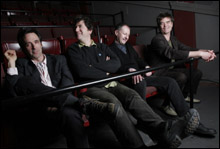
Mission of Burma
|
You can tell a lot, the thinking goes, by a man’s record collection, and even more by a man’s DJ set. And if not? Well, you still got to hear the new Mission of Burma record The Obliterati (Matador, due May 23) the other night at the Enormous Room in Cambridge, where Burma took over the turntables for a night. Their manager, Mark Kates, brought two iPods. Roger Miller brought a small CD case, with his 12-song playlist meticulously typed out on a sheet of paper. Peter Prescott brought a backpack stocked with a crate’s worth of vinyl, and kept pulling out albums that he didn’t play (James Last’s Voodoo Party, green-vinyl bootleg of radio spots by ’70s rock bands, a collection of Frances Lai’s soundtrack music), just to show people the sleeves. Clint Conley stayed home.Kates, who despite his rock and roll credentials maintains a torrid affair with dance music under the name DJ Carbo, alternated songs from The Obliterati with his own wide-ranging selections: Burma tune, Dresden Dolls tune, Burma tune, techno tune. Asked for the provenance of a particularly un-Burma-like thump, he shrugged and scrolled through his iPod playlist. “I’m not a huge fan of house music, but the vocals are amazing. You can’t hear them right now, but this song’s great.”

If you’d got a sneak peak at the Burma documentary Not a Photograph: The Mission of Burma Story (a brief trailer for which screened in a continuous loop underneat the music), you would have recognized several longtime Burma characters in the flesh. Rick Harte, who was instrumental in producing, picking, and releasing Burma recordings -- from the group’s first single “Academy Fight Song,” to their comeback album, OnOffOn -- huddled with Miller and Kates to strategize about the pair of unreleased Burma songs he recently unearthed on an old tape reel. As Kates played the new Prescott-penned “Let Yourself Go,” Eric Van, the Red Sox statistician who is only marginally less well known as the world’s biggest Burma superfan, came running back to the DJ booth. “Roger, what time is this in?,” he asked. “Six,” Miller said, shaking his head, as if it were just an approximation. “Four. Even Peter didn’t know what it is. He showed us the riff, we could not figure it out. He would try to play it on guitar to me and Clint, and we’d think we had it, but then -- no. So we said, ‘Show it to us on the drums,’ and as soon as we heard where the kick drum falls, we got it. I told him, ‘Oh, it’s in two different times,’ and Peter looked at me very surprised and said, ‘It is?’”
The new Burma album had been described to me months ago as their “heaviest” album, and it may well be their angriest. What’s so surprising about this isn’t just that a band has made its angriest record in middle age, but that Miller infamously broke up the band precisely because it had got too loud. His tinnitus has been carefully managed with protective headphones and drum shields, and he still has sensitive ears. As Conley’s new “Is This Where” played, Miller turned to Kates, who was handling the sound system. “Did you throw some equalization on that?” he asked, nodding in the direction of the sound board. “I can hear everything clearer now.”
While DJ Zeppo Ramone (Kates’ assistant and former WERS DJ Marc Donohue) blasted a Buzzcocks song, Miller leaned in and asked a bystander, “How much do you know about Roxy Music?” Not enough, replied the student. “Brian Eno got his start with Roxy, and they were the first rock band to use tape loops,” Miller said. “That’s where Burma got it from -- somewhat indirectly, but that’s where it came from, that’s the history. So that’s why I’m playing them first.”
“Also,” he contintued, “Roxy had this thing where they were the only thing going in rock and roll from about ’72 to ’74, but then they fucked up just right before punk hit, so they never really got the credit they deserved.”
The student suggested the same thing could be said for Burma. “It’s possible,” Miller smiled, arching an eyebrow. “But I don’t know anything about that band.”
Kates was still working his way through The Obliterati’s final song, “Nancy Reagan’s Head.” “In the middle section,” Miller recalled, “Clint plays this instrument, I can’t remember what it’s called -- it’s like a mellotron, it’s got a men’s chorus on it -- and he couldn’t get it right. It sounded like the men couldn’t hit the note. And Clint said, ‘Roger, you play it.’ Now, I could play it right, but it would sound too correct. I could play it right but it would sound wrong.”
With The Obliterati out of the way, Miller took over the decks. After his Roxy Music track, he cued up the Girls’ Live at the Rat. “The Girls were the first band I saw in Boston,” Miller said, “and when I saw them I thought, ‘I’m in the right place.’”